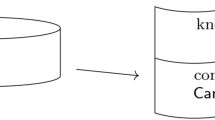Abstract
Designing ontologies and specifying axioms of the described domains is an expensive and error-prone task. Thus, we propose a method originating from Formal Concept Analysis which uses empirical data to systematically generate hypothetical axioms about the domain, which are represented to an ontology engineer for decision.
In this paper, we focus on axioms that can be expressed as entailment statements in the description logic \({\mathcal{F\!LE}}\). The proposed technique is an incremental one, therefore, in every new step we have to reuse the axiomatic information acquired so far. We present a sound and complete deduction calculus for \({\mathcal{F\!LE}}\) entailment statements.
We give a detailed description of this multistep algorithm including a technique called empirical attribute reduction and demonstrate the proposed technique using an example from mathematics.
We give a completeness result on the explored information and address the question of algorithm termination. Finally, we discuss possible applications of our method.
Preview
Unable to display preview. Download preview PDF.
Similar content being viewed by others
References
Baader, F.: Computing a Minimal Representation of the Subsumption Lattice of all Conjunctions of Concepts Defined in a Terminology. In: Proceedings of the International Symposium on Knowledge Retrieval, Use, and Storage for Efficiency, KRUSE 1995, Santa Cruz, USA (1995)
Baader, F.: The Description Logic Handbook: Theory, Practice, and Applications. Cambridge University Press, Cambridge (2003)
Blackburn, P., de Rijke, M., Venema, Y.: Modal Logic. Cambridge University Press, Cambridge (2001)
Dowling, W.F., Gallier, J.H.: Linear-time algorithms for testing the satisfiability of propositional Horn formulae. J. Logic Programming 3, 267–284 (1984)
Ganter, B.: Two basic algorithms in concept analysis. FB4-Preprint No 831, TH Darmstadt (1984)
Ganter, B., Wille, R.: Formal Concept Analysis: Mathematical Foundations. Springer, Heidelberg (1999)
Ganter, B., Rudolph, S.: Formal Concept Analysis Methods for Dynamic Conceptual Graphs. In: Delugach, H.S., Stumme, G. (eds.) Conceptual Structures: Broadening the Base, Springer, Heidelberg (2001)
Guigues, J.-L., Duquenne, V.: Familles minimales d’implications informatives resultant d’un tableaux de donnés binaires. Math. Sci. Humaines 95 (1986)
Horrocks, I. et al.: The Ontology Inference Layer OIL, http://www.ontoknowledge.org/oil/papers.shtml
Horrocks, I., Sattler, U., Tobies, S.: Reasoning with individuals for the description logic SHIQ. In: McAllester, D. (ed.) CADE 2000. Lecture Notes in Computer Science (LNAI), vol. 1831, Springer, Heidelberg (2000)
Horrocks, I.: Benchmark analysis with fact. In: Dyckhoff, R. (ed.) TABLEAUX 2000. Lecture Notes in Computer Science (LNAI), vol. 1847, Springer, Heidelberg (2000)
Prediger, S.: Terminologische Merkmalslogik in der Formalen Begriffsanalyse. In: Stumme, G., Wille, R. (eds.) Begriffliche Wissensverarbeitung: Methoden und Anwendungen, Springer, Heidelberg (2000)
Rudolph, S.: An FCA Method for the Extensional Exploration of Relational Data. In: de Moor, A., Ganter, B. (eds.) Using Conceptual Structures: Contributions to ICCS 2003, Shaker Verlag, Aachen (2003)
Schmidt-Schauß, M., Smolka, G.: Attributive concept descriptions with complements. Artificial Intelligence 48, 1–26 (1991)
Sowa, J.: Ontology, Metadata, and Semiotics. In: Ganter, B., Mineau, G.W. (eds.) ICCS 2000. Lecture Notes in Computer Science (LNAI), vol. 1867, Springer, Heidelberg (2000)
Wille, R.: Conceptual Graphs and Formal Concept Analysis. In: Lukose, D., Delugach, H., Keeler, M., Searle, L., Sowa, J. (eds.) Conceptual Structures: Fulfilling Peirce’s Dream, Springer, Heidelberg (1997)
Zickwolff, M.: Rule Exploration: First Order Logic in Formal Concept Analysis, PhD thesis, TH Darmstadt (1991)
Author information
Authors and Affiliations
Editor information
Editors and Affiliations
Rights and permissions
Copyright information
© 2004 Springer-Verlag Berlin Heidelberg
About this paper
Cite this paper
Rudolph, S. (2004). Exploring Relational Structures Via \({\mathcal{F\!LE}}\) . In: Wolff, K.E., Pfeiffer, H.D., Delugach, H.S. (eds) Conceptual Structures at Work. ICCS 2004. Lecture Notes in Computer Science(), vol 3127. Springer, Berlin, Heidelberg. https://doi.org/10.1007/978-3-540-27769-9_13
Download citation
DOI: https://doi.org/10.1007/978-3-540-27769-9_13
Publisher Name: Springer, Berlin, Heidelberg
Print ISBN: 978-3-540-22392-4
Online ISBN: 978-3-540-27769-9
eBook Packages: Springer Book Archive




